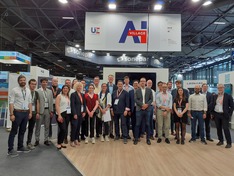France and Germany are strengthening their cooperation in the field of artificial intelligence - 5 joint projects launched at the first edition of the AI Village
France and Germany have pledged a total of 17.5 Mio. € for five joint cooperation projects that aim to develop new artificial intelligence (AI) solutions to make our world more resilient to crises of different kinds. In particular, the projects intend to create AI solutions to fight climate change, to early detect and combat future epidemics and to make our industries more resilient to the supply-chains interruptions.
In the Treaty of Aachen (2019), Germany and France agreed to step up their cooperation in the field of artificial intelligence. As a result, the countries launched a joint call for proposals in February 2021. This call for projects was a great success, with 25 projects submitted and a total of 119 partners. There were 42 SMEs that applied, 17 large groups, 52 laboratories, research institutes and universities and 8 public institutions. The five winning projects have started in Spring 2022.
Below you can find a short description of each project and the Franco-German participants.
The AIOLOS - Artificial Intelligence Tools for Outbreak Detection and Response project aims at integrating a large variety of data sources and at developing new AI-based models to monitor and detect new outbreaks, predict the future epidemic development, evaluate the impact of different interventions and define health resource needs to get the epidemics under control.
Partners: Fraunhofer-Gesellschaft zur Förderung der Angewandten Forschung e.V. (GER), Umlaut Consulting GmbH (GER), CompuGroup Medical SE & Co. KGaA (GER), Quinten (FRA), Sanofi Pasteur (FRA)
The CONTRAILS - Contrails in the Climate System: from Observation to Impact Modeling and Prediction project aims at developing and coupling trustworthy AI methods and physical models to improve the identification, characterisation, data assimilation and forecasting of contrails. The outputs of this project would provide tools to monitor the impact of contrails on the climate and help inform future experimental tests of trajectory optimization by preventing their formation.
Partners: Deutscher Wetterdienst (GER), Thales Research & Technology (FRA), Reuniwatt SAS (FRA), Laboratoire atmosphères, milieux, observations spatiales (FRA)
The RenovAIte - Boosting renovation industry with AI project will provide software based on artificial intelligence to optimise housing and road renovation at a large scale. It will cover the whole value chain from data acquisition to decision making tools for design offices, local authority landlord and local authority road management services.
Partners: OFFIS - Institut für Informatik (GER), VIA IMC GmbH (GER), Action Logement (FRA), ALEIA (FRA), Leonard (FRA)
The GreenBotAI - Frugal and adaptive AI for flexible industrial Robotics project has three main objectives, to ensure continuous production in Europe during pandemics, to ensure European sovereignty regarding production automation and to reduce the environmental impact of European factories – by reducing robotic applications energy consumption by 50%. These objectives are to be reached by developing an intelligent system that should allow industrial robots to self-adapt to the production line needs, to handle complex and laborious tasks and therefore improve working conditions, to control for defects while handling items and to reduce the installation and teach-in phase.
Partners: Fraunhofer-Gesellschaft zur Förderung der angewandten Forschung e. V. (GER), Hochschule München University of Applied Sciences (GER), GrAI Matter Labs SAS (FR), Arts et Métiers (ENSAM LIPSEN) (FRA)
The GANResilRob - Generative Adversarial Networks and Semantics for Resilient, Flexible Production Robots project intends to increase resilience in French and German production industry by combining knowledge and technologies on AI based robotic assembly planning, semantic understanding and remote, intuitive task programming. The main objectives are to create digital production systems by enhancing industrial robots with AI technologies; to reduce human contacts during pandemic crises by integration of remote-controlled task teaching; to automatically adapt the production in case of interrupted material supply chains by switching to other products.
Partners: FZI Forschungszentrum Informatik (GER), ArtiMinds Robotics GmbH (GER), Secma SA (FR), Two-I SAS (FR), CNRS IRL2958 GT-CNRS (FR)
These five projects represent 23 partners including 10 SMEs, 6 universities/research institutes, and 6 large companies and 1 public institution. They will be launched on May 18, 2022 in an international kick-off event at the first edition of the AI Village, within the large industrial fair Global Industrie in Paris.
Global Industrie brings together over 2000 exhibitors from all sectors of the industry. The AI Village is organized during the French Presidency of the Council of the European Union and will be an important opportunity to showcase European expertise on Artificial Intelligence and to put the spotlight on important applications of AI for industry and for enterprise.
With its dedicated space for exhibition, it will also be an opportunity for innovative start-ups, SMEs and large groups to create business opportunities and reinforce connections between AI ecosystems in Europe. The program for the AI Village will also include 5 high-level roundtables on important topics such as (a) Future technological challenges of AI for industry, (b) European strategies on AI and how to compete with other great regions of the world, (c) Trustworthy AI: a framework for an ethical, reliable and certifiable European AI offer, (d) Driving adoption of AI by SMEs: success stories, obstacles and challenges, (e) The EU AI Act.
During these roundtables, representatives from the French-German Academy for the Industry of the Future and the French-German Institute for the Industry of the Future; Benjamin Brake, Director General for Digital and Data Policy, German Federal Ministry for Digital and Transport; Sonja Zillner, Lead of Core Company Technology Module, Siemens AG; Andreas Liebl, Managing Director at UnternehmerTUM, appliedAI Initiative and Member of GPAI innovation & commercialization of AI working group will all be participating.
- Recommend this page:
- Print view
